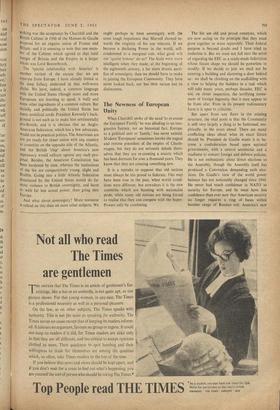The Newness of European Unity
When Churchill spoke of the need `to re-create the European Family' he was alluding to an ima- ginative fantasy, not an historical fact. Europe, as a political unit or `family,' has never existed. Modern `Europeans' sometimes invoke the august and remote precedent of the empire of Charle- magne, but they do not seriously delude them- selves that they are re-creating a society which has been dormant for over a thousand years. They know that they are creating something new.
It is a mistake to suppose that old nations must always be too proud to federate. This may have been true in the past, when world condi- tions were different; but nowadays it is the new countries which are bursting with nationalist , pride, while many old nations are being forced to realise that they can compete with the Super- Powers only by combining. The Six are old and proud countries, which are now acting on the principle that they must grow together or wane separately. Their federal purpose is beyond doubt and I have tried to underline it. But we must not fall into the error of regarding the EEC as a ready-made federation whose future shape we should be powerless to modify. If we decide to join we shall not be entering a building and slamming a door behind us: we shall be climbing on the scaffolding with a view to helping the builders in a task which will take many years, perhaps decades. EEC is not, on closer inspection, the terrifying monu- ment of foreign ingenuity that it may appear to be from afar. Even in its present rudimentary form it is open to criticism.
But apart from any flaws in the existing structure, the vital point is that the Community is still very largely a thing to be fashioned, em- pirically, in the years ahead. There are many conflicting ideas about what its exact future should be. President de Gaulle wants it to be- come a confederation based upon national governments, with a central secretariat and a readiness to concert foreign and defence policies. He is not enthusiastic about direct elections to the Assembly, though the Assembly itself has produced a Convention demanding such elec- tions. De Gaulle's view of the world power balance has not noticeably changed since 1944. He never had much confidence in NATO as security for Europe, and he must have less confidence than ever now that American security no longer requires a ring of bases within bomber range of Russian soil. America's new frontier, he may contend, is not in Europe. but in the oceans and in Space.
Without sharing de Gaulle's suspicion of the United States, other Europeans are convinced that the organic unity of Western Europe in all sectors of policy is a necessary first step to the wider Atlantic union that they hope one day to see. Such idealists, whose voices are strong in the Community, are keen that Britain should join, because they feel that if Britain's stand-offishness could be conquered, America's might be too. But that is by no means their only reason for wanting Britain to join. They are also impressed with the British record of stable parliamentary government, and they would expect us not only to contribute valuable advice on the form of European institutions, but also to help those in- stitutions to work by our presence in the Com- munity. They have watched with anxious joy the Franco-German reconciliation . called for by Churchill, which has been the foundation-stone of EEC; they believe that the Community has done much to integrate Germany with the West, but they would feel even more confident if Britain were to exchange the ambiguous role of 'friend and sponsor' for the responsibilities and opportunities of membership.











































 Previous page
Previous page